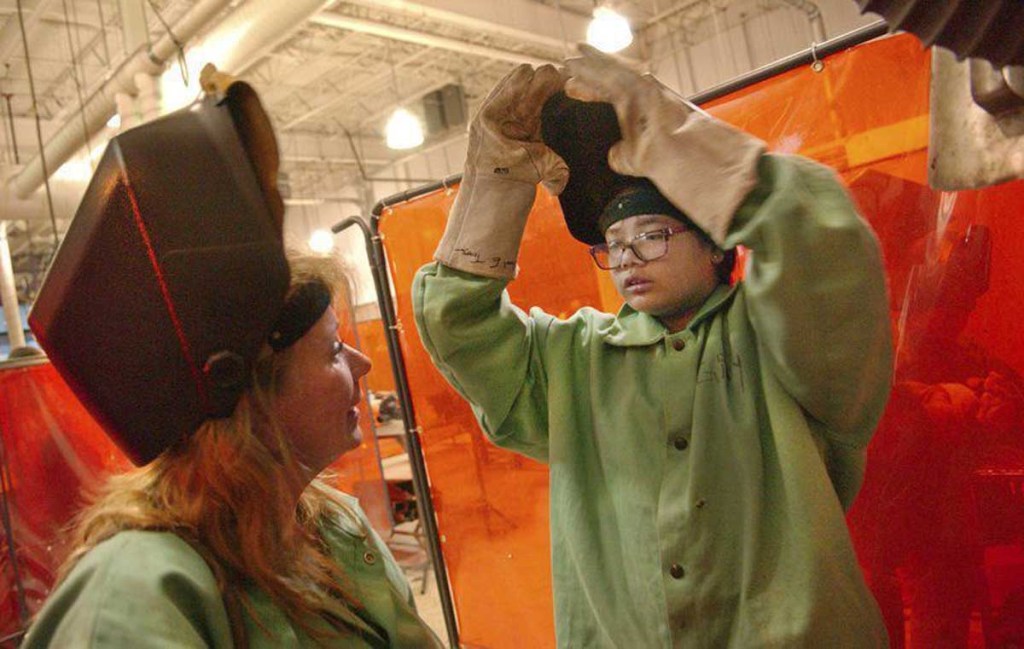Indiana summit encourages girls to think about manufacturing careers
Published 11:46 am Thursday, October 13, 2016

- Century Career Center teacher Christine Linzey, left, talks to Thida Nomany, 11, who goes to Lincoln Middle School, about learning to weld during the Girls in Manufacturing Summit on Saturday in Logansport, Indiana.
Women comprise nearly half the nation’s workforce, but the manufacturing sector is just 29 percent female, according to the U.S. Bureau of Labor Statistics.
A recent population survey done by the bureau found that participation among those roughly 4.5 million women was highest in jobs that are deemed as stereotypical to gender — retail bakeries, textile mills and sewing and apparel manufacturing, for example.
Trending
Joe Veter is trying to change that.
Veter is a precision machining instructor at Century Career Center, a technical school in Logansport, Indiana. He helped create the Girls in Manufacturing Summit, a program aiming to tap women in traditionally male-dominated manufacturing jobs to inspire middle school and high school-aged girls to consider those career paths.
“It’s my fault,” Veter said, laughing. “I was in a leadership development program at Purdue University, and one of my goals in the program was to recruit non-traditional students to these types of manufacturing areas. And the non-traditional ones in this case are young girls.”
Partnering with Ivy Tech, a community college with 30 campuses in Indiana, the summit is in its second year. It introduces girls in eighth to 12th grades to local women who have made manufacturing a career.
The panel of women addressed the young girls for about an hour Saturday, sharing everything from insights about the manufacturing sector to mentors that helped them along the way. They also offered some advice for breaking into manufacturing as a woman.
Stephanie Wells, a lobbyist for the Indiana Manufacturers Association, told the students that she took the Armed Services Vocational Aptitude Battery, or ASVAB, in high school and scored high on the mechanical portion of the test.
Trending
“They told me it must have been a fluke,” she said. “I was told by a lot of people that girls don’t do math. Girls don’t do science. Girls don’t work with their hands. I think if I heard what you get to hear now when I was in the eighth grade, my life would have been a lot different.”
The summit mirrors efforts nationwide to interest girls in career paths traditionally dominated by men — specifically in the fields of science, technology, engineering and math (STEM).
Dr. Deanna McMillan, an adjunct professor at Ivy Tech with a background in engineering, told the girls that growing up in New York City, she thought an engineer was someone who drove a train. Now, multiple doctorates later, McMillan said it’s about fighting for what you want to achieve.
“Never let someone tell you you can’t do something,” she told the crowd. “I’ve been told numerous times before and even after my degrees that I couldn’t do it. It just made me fight harder. It takes extra effort to succeed in an area where you have no role models. Take advantage of every opportunity.”
Cathy Fawcett, an industrial engineer at A. Raymond Tinnerman, a Michigan-based automobile and truck parts manufacturer, graduated with a degree in industrial engineering from Purdue. She said out of 130 students in her graduating class, she was one of just five women. She said she heard how manufacturing was a man’s profession, but she didn’t let that bother her, and she said she wanted the girls in attendance to not be bothered by it either.
“I want them to walk away from today with the ability to dream and not be held back by preconceived notions,” she told the Logansport, Indiana Pharos-Tribune. “Stretch beyond that.”
Dunlap writes for the Logansport, Indiana Pharos-Tribune.





